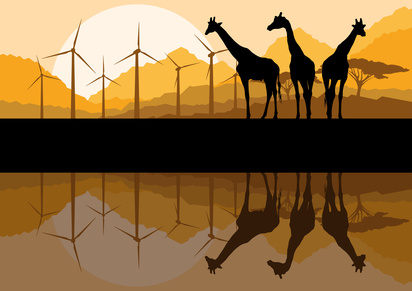
Remote grid opportunities are huge and still expanding across many African markets. Africa’s severe energy crisis has inspired stakeholders to explore diverse solutions, models, and energy mixes to provide much-needed power in many countries in Sub-Saharan Africa (SSA). Though remote grids and renewable solutions are in their infancy here, they are increasingly taking center stage in many energy conversations as the region experiences population growth, greater energy demands, increased urbanization, and insufficient or unreliable main grid power supply.
Following COP 21 (Conference of the Parties at Paris climate talks), the call for sustainable energy solutions has increased, with policymakers and the private sector alike asking critical questions moving forward. With increasing attention, reviews, and support, promoters wonder what challenges may exist in Africa’s unique context. Overcoming financial considerations, confusing regulations, infrastructure issues, and difficult terrain requires an understanding of and strategies for Africa’s unique context.
Financing
Equity contribution from project promoters typically covers a good portion of remote grid projects, while debt financing (which could be hard to raise) makes up the remainder. The limited application of remote grids (especially given main-grid dominance in the region) can lower their bankability. The financial institutions, private equities, and institutional lenders traditionally used to contribute to these types of projects may have unfavorable opinions of remote grids. With minimal or nonexistent support or capital contribution, financing difficulties can be a serious drawback for Joint Venture (JV) partnerships, in which a local partner is required to provide a reasonable portion of the required project financing. Financing is also a challenge for projects fully promoted by an indigenous enterprise. There are, nevertheless, a number of funds from national governments and regional institutions – such as the African Development Banker (AfDB) – for minigrids, remote grids, and renewable energy project development.
In time, successes of the first series of remote grid projects will provide a case for potential promoters to use as an evidence of viability, increasing the overall bankability and attractiveness to financiers in SSA. In the meantime, project promoters are required to craft novel financing strategies and capital structure for remote grid initiatives in the region.
Regulatory flux
The power sector across many African countries is in a state of regulatory flux. Energy laws and policies are aggressively being reviewed and updated to reflect the private sector’s emerging role in these regions. The changes will ultimately provide a better business environment but currently entail uncertainty and risks. The primary challenge is that most reforms (including in Nigeria and South Africa) are proceeding at a slow pace and sometimes with limited clarity. Uncertainties in regulations governing power investments such as remote grids can be upsetting for project developers. Consequences of regulatory flux range from lengthy and ambiguous approval/licensing processes to the risk of being tangled in non-compliance penalties or litigation. Project developers must figure out what works, which markets have greater policy and regulatory stability, and how in-house strategies can be made to match the compliance environment.
Infrastructure and terrain
Remote grid projects in SSA must consider operability. Africa’s level of infrastructural development means the terrain can be very difficult to access or outright inaccessible in many instances. Getting employees to the project site or to attend to transmission and distribution infrastructure can be very difficult in areas with limited road networks or poor transportation systems. Similarly, infrastructure challenges make access to equipment and fuel supply potentially unreliable. There are also genuine concerns with asset security, concerns which may make it equally challenging to keep an operational, maintenance, or management team on the ground.
For remote grid solutions that hope to feed into main grids, the poor state of transmission and distribution infrastructure in many countries can jeopardize easy monetization. Primary concerns are the legal terms for feed-in, which may be poorly developed, and the state of the distribution and transmission infrastructure, which can introduce ambiguity in metering and supply estimation. However, in areas with better infrastructure, these concerns will be alleviated. Project profitability and success can then be much higher.
Chijioke Mama is a senior energy analyst, strategy consultant, and syndicated columnist. He is one of the leading voices in Africa’s energy discourse, with more than 40 research-based and investment-focused publications on energy matters in Sub-Saharan Africa. His analytical works are syndicated across top business publications in the UK, US, and Africa, with diverse advisory and consulting engagements for energy and infrastructure firms in these regions.
